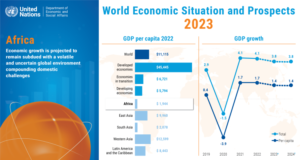Written by Clifford Egbomeade
The global economy currently faces an unprecedented myriad of challenges – recovery from COVID-19 pandemic, the looming climate change crisis, and the war in Ukraine, which have led to disruptions in supply chains, surging inflation, and debt tightening. The impact of these global issues has been significant, as evidenced by projections indicating that global output will plummet from 3% in 2022 to just 1.9% in 2023, one of the lowest rates in recent decades. Sadly, Africa is not spared, as companies continue to contend with the fallouts of these global issues.
With the world’s largest free trade area, a combined gross domestic product (GDP) valued at US$3.4 trillion, and a 1.4 billion-person market connected across 54 countries, Africa is creating an entirely new development path, harnessing the potential of its resources and people. And African companies are not left out.

Source: United Nations Department of Economic and Social Affairs (DESA)
In recent years, African brands have been on the rise, gaining international recognition for their innovative approaches to business and their ability to navigate today’s VUCA world. From political unrest to economic instability and global pandemics, African brands have had to contend with a range of crises that have threatened businesses across the continent. However, instead of buckling under pressure, some brands have seized these challenges as opportunities to create new opportunities that resonate with their audiences. One aspect where African companies have shown resilience and adaptability is crisis management.
Crisis management is an essential component of any business, regardless of the industry or geographical location. In simple terms, it is the process by which an organisation deals with a major event that threatens to harm the organisation, its stakeholders, or the public. This involves anticipating and assessing risks, developing a plan to address the risks, and implementing that plan in a timely and efficient manner when a crisis occurs. The ultimate goal of crisis management is to protect an organisation’s reputation, minimise damage, and enable the organisation to recover as quickly as possible from the crisis.
Organisations with a strategic crisis response plan can mobilise more swiftly, stabilise business operations and respond to the shockwaves of disruption and uncertainty. African businesses are managing to navigate through crises, despite the fact that the vast majority of business leaders worldwide have acknowledged that their own crisis management capabilities could be better. Although this is a widespread challenge for many companies, there are still some African brands that are successfully weathering the storm.
A Focus on Kenya Airways
In 2013, Kenya Airways faced a crisis when one of its planes, a Boeing 787 Dreamliner, caught fire while parked at London’s Heathrow Airport. The incident caused significant damage to the aircraft and led to the temporary suspension of all 787 flights by several airlines worldwide. Kenya Airways responded swiftly to the crisis, with its management team flying to London immediately to co-ordinate the response. The company’s crisis management team also promptly established a command centre to monitor the situation and keep all stakeholders informed. The airline’s communication strategy was a key factor in its successful crisis management; it issued regular updates to the media, investors, and customers, providing accurate and timely information about the incident, the damage to the aircraft, and the impact on the airline’s operations.
Kenya Airways demonstrated transparency by admitting the technical issues that led to the fire and taking responsibility for the incident. This helped to build trust and credibility with stakeholders, and the company was praised for its openness and honesty in dealing with the crisis.
Corporate Crisis and Social Responsibility in Nigeria
In 2015, MTN faced a challenge that ultimately led to positive change when it took action to address unregistered SIM cards. The company responded by launching an extensive public relations campaign, which included a public apology and a commitment to improving its operations in Nigeria. MTN also engaged with stakeholders to address their concerns and launched a dedicated website to provide customers with information about the crisis and how the company was addressing it. By taking immediate steps to address the issue, engaging in open and transparent communication, and working to resolve the issue with the government, MTN Nigeria was able to minimize the impact of the crisis on its business and reputation. The crisis ultimately resulted in MTN being recognised as a leader in corporate governance and transparency in Africa. By the end of the fourth quarter of 2022, MTN had grown its mobile subscriber base to 75.6 million, recording a revenue of ₦2.01 trillion — a 21.5% increase from 2021 — and profit after tax of ₦359 billion — a 20.2% increase from 2021 — for the year.
The End SARS (Special Anti-Robbery Squad) campaign was a nationwide protest in Nigeria that started in October 2020. The decentralised movement gained momentum and resulted in widespread protests across the country, leading to a crisis situation for many Nigerian companies. Some financial institutions in Nigeria leveraged social media platforms to provide information to their customers about the End SARS campaign, positioning the brands as socially responsible organisations. Other brands used social media, especially Twitter, to express support for the End SARS campaign by issuing public statements and providing logistical and financial support for victims of the protest.
South Africa: Sasol’s Crisis Management Response
Sasol, a global integrated chemicals and energy company, experienced a crisis when a group of employees staged a protest outside the company’s head office in Sandton, Johannesburg. The protest was related to Sasol’s revised black share scheme, which excluded certain groups of employees from the benefits.
To address the crisis, Sasol’s public relations team issued a statement, expressing their commitment to transformation and stating that they were engaging with the affected employees to find a solution. The company also held a series of meetings with employee representatives to address their concerns and find a mutually acceptable solution. In addition to these efforts, Sasol also launched a broader public relations campaign to communicate its commitment to transformation and diversity. This campaign included a series of advertisements in national newspapers, as well as a social media campaign featuring interviews with Sasol’s employees from diverse backgrounds. Overall, Sasol’s response to the black share scheme controversy was effective in managing the situation and mitigating reputational damage.
By being proactive, innovative, and responsive, these organisations have demonstrated their commitment to customers, employees, and communities. They have also shown that businesses can have a positive impact on society, even in times of crisis. For example, during the Ebola outbreak, African brands took proactive measures to contain the spread of the virus. They provided hand sanitisers and disinfectants to their employees, implemented social distancing measures, and ensured that their products and services were safe for customers.
Strategies for Effective Crisis Management
- Communicate proactively
- Transparency
- Engage with relevant stakeholders
- Prioritise social responsibility
- Be innovative
- Communicate proactively
Proactive communication is critical in managing crisis. It involves anticipating potential issues and communicating with stakeholders before a crisis occurs to establish trust and build relationships. Proactive communication also involves regularly updating stakeholders during a crisis to keep them informed and engaged. Many leading brands in Africa are using proactive communication to manage crisis. For example, Safaricom‘s regular updates to customers during its mobile money service outage was a proactive communication strategy that helped to keep customers informed and engaged.
- Transparency
Transparency is another critical component of effective crisis management. It means being open and honest with stakeholders about the crisis and its impact on both the organisation and customers. Transparency also involves admitting mistakes and taking responsibility for the crisis. Coca-Cola’s sustainability campaign was a transparent crisis management strategy that aimed to address concerns about the company’s impact on water resources in Africa. The campaign involved reducing water usage in its bottling plants, supporting local water conservation projects, and engaging with stakeholders.
- Engage with relevant stakeholders
Engaging with stakeholders helps to manage their expectations and provides reassurance that the brand is taking action to resolve the crisis. African businesses recognise that stakeholders, including customers, employees, and local communities, are crucial to their success, and engaging with them during times of crisis can help to build trust and reduce negative public perception.
- Prioritise social responsibility
Crisis often has a disproportionate impact on vulnerable communities, and organisations that prioritise social responsibility during a crisis are better able to build trust and credibility with their customers. For example, during the COVID-19 pandemic, some companies within the continent donated funds and resources to support healthcare workers, provided free products to vulnerable communities, and implemented safety measures to protect their employees. These actions helped them to demonstrate their commitment to corporate social responsibility and build stronger relationships with their customers.
- Be innovative
In crisis situations, businesses are trypically requred to change their operations and adapt to the changing business environment. Today, some brands have optimised their business models based on current realities. For example, organisations that relied on physical stores to sell their products have pivoted to online sales. Others have invested in e-commerce platforms, created new products, and implemented new business strategies. These innovations help African businesses to meet their customers’ needs in times of crisis.
Conclusion
The success of African brands in managing crisis can be attributed to their ability to be agile and innovative, to think outside the box, and to communicate clearly with stakeholders. By embracing challenges and using them as opportunities to build their brands and change the surrounding narratives, African businesses are setting themselves up for long-term success and cementing their place on the global stage.
As African businesses adapt to new realities, crisis management will become an increasingly critical element of success. It is crucial for African brands to be ready with a strategic, adaptive and timely response to major threats — and then to take action on lessons learned after a crisis has passed.
Written by Clifford Egbomeade
Clifford Egbomeade (MCIPR) is a public relations and communications adviser at ID Africa, a leading PR & Communications advisory firm with offices in Nigeria, Ghana, and Kenya. Clifford is based in Lagos, Nigeria and can be reached on egbomeadeclifford@gmail.com

